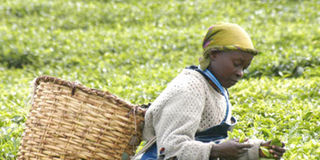State creates Sh20bn fund to rescue tea farmers when prices fall

A woman plucking tea at a plantation in Nandi Hills. The govt has launched a special fund to subsidise tea farmers when international prices fall below production costs.
The State has launched a Sh19.5 billion special fund to subsidise tea farmers when international prices fall below production costs.
The stabilisation fund, announced by Agriculture Cabinet Secretary Peter Munya on Monday, is the government’s latest bid to help farmers struggling as tea prices fluctuate and many of them operate at a loss.
Tea prices have been under pressure globally as other countries increase output and exports. With high production costs locally, earning margins for farmers have thinned, with some even threatening to uproot the crop and plant others such as avocado that have better returns.
Kenya vies with China and Sri Lanka as the world’s top tea exporter.
“Inefficient price discovery, fluctuating international tea prices, collusion and conflict of interest among value chain players, limited range of market destinations and low domestic consumption of tea are among the challenges affecting the sector at the trading level,” Mr Munya said when he launched the rescue scheme.
The subsidies will kick in when the price of tea falls below production costs
The Treasury will issue Sh6 billion to the kitty in the next two financial years, according to a report seen by the Nation.
The fund comes as farmers are already enjoying a minimum price of $2.45 (Sh278.87) for a kilo of tea leaves that was introduced in June last year.
Mr Munya said the minimum price, established after the price of tea fell to a 10-year low, increased farmers’ earnings by Sh13 billion between June and December last year.
The fund will offer farmers a much-needed cushion when the prices of the beverage in the market are depressed, said Peris Mudinda, the acting CEO of the Tea Board of Kenya.
A task force led by Irungu Nyakera was appointed by Mr Munya in April 2021 to look into ways of creating a stabilisation fund to cushion tea farmers.
The team recommended a reduction in production costs and increased productivity at the farm level. It urged the government to facilitate bulk procurement of fertiliser, the introduction of plucking and pruning machines and replacement of old tea bushes with high-yielding varieties.
Mr Munya said the ministry would submit a Cabinet memorandum seeking approval for a structured and targeted fertiliser subsidy programme for the tea sector.
The ministry will also work with industry players to develop guidelines on the use of mechanical tea harvesting equipment to save on labour costs.
Mechanical tea harvesting on smallholder farms is being piloted alongside training farmers who will then train others.





